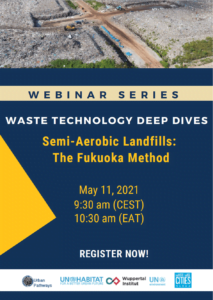 Our past Deep Dive webinars highlighted recovery options for different types of waste – e-waste, organic waste and dry recyclables. Although cities should strive to use these technologies as much as possible, there will almost always be a “rest” (residues/rejects) which will have to be disposed off in an environmentally sound way. One possibility to construct a sanitary landfill is the so-called “Fukuoka Method”, a low-cost safe landfill management method born in Fukuoka City in Japan in the 1960s using natural ventilation mechanism to accelerate the decomposition and stabilisation of waste. The ventilation also reduces the pollution
Our past Deep Dive webinars highlighted recovery options for different types of waste – e-waste, organic waste and dry recyclables. Although cities should strive to use these technologies as much as possible, there will almost always be a “rest” (residues/rejects) which will have to be disposed off in an environmentally sound way. One possibility to construct a sanitary landfill is the so-called “Fukuoka Method”, a low-cost safe landfill management method born in Fukuoka City in Japan in the 1960s using natural ventilation mechanism to accelerate the decomposition and stabilisation of waste. The ventilation also reduces the pollution
level of the leachate and reduces greenhouse gas emission compared to conventional anaerobic landfills. This webinar described in details this concept and illustrated it through a case study from Ethiopia.
The webinar is part of a series of Deep Dives into selected waste management technologies, organized by UN-Habitat’s Waste Wise Cities initiative, African Clean Cities Platform and the Wuppertal Institute for Climate, Environment, Energy, under the Urban Pathways Project.
